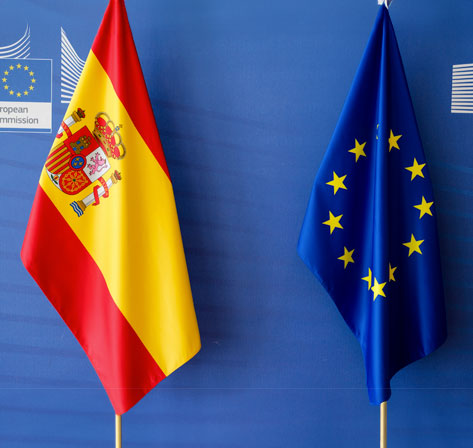July 2023
European Perspective on 2023 Spanish Presidency of the Council of the European Union
Region: Transatlantic Perspectives: Europe
Author: Stephany Vargas
Now or never? Spain’s presidency is a golden opportunity
On the 1st of July 2023, Spain took up the Presidency of the European Council of the European Union. Until December 2023, Spain will have the ability to nudge the direction of the EU’s already packed legislative agenda. With the 2024 European parliamentary elections approaching fast, the upcoming semester will be the last major opportunity to push through specific legislation before the leadership of key EU institutions changes, with the delays that such a change inevitably entails. While the way in which Spain chooses its priorities might be impacted by the outcome of the national elections that will take place at the end of July, interested parties should use the upcoming six months to double down on targeted engagement with the European Union to close any pending EU legislative files before March 2024.
Calm before the storm
The Spanish Presidency will be followed by Belgium until June 2024 and then by Hungary until December 2024. Bearing in mind that European parliamentary elections will take place in June 2024, Belgium’s stint at the head of the Council will likely be heavily disrupted from March 2024 onward as campaigning will ramp up and take momentum away from the legislative agenda. Following the vote, the steady rise of more radical, often populist, parties throughout Europe will likely result in a splintered Parliament and impact the legislative process of files that have not crossed the finish line by then.
In addition, Hungary’s Presidency is something of a wild card, given the Orbán government’s frontal opposition to other member states on key issues such as rule of law and the war in Ukraine. In fact, the current Members of the European Parliament recently put out a resolution questioning Hungary’s ability to “credibly fulfil” the tasks associated with the rotating presidency. The resolution is non-binding but has to be seen in conjunction with the European Commission’s ongoing withholding of nearly €28 billion in EU funds from Budapest over rule of law concerns. Considering that the Hungarian Presidency have to help set the agenda with the new Parliament and help appoint the new Commission, there is considerable uncertainty on the conditions under which Hungary eventually, if at all, takes on the Presidency.
This places Spain under considerable pressure to steer as many of the proposals currently in the legislative pipeline to success. Madrid is conscious of this responsibility and seems determined to play a constructive role despite the upcoming national elections on July 23. While the current socialist government is widely expected to lose power, none of its main competitors holds Euro-sceptic views. In addition, the current administration has ensured that it is in open dialogue with the opposition to ensure a smooth transition.
Room for progress
Despite the delay in the announcement of Spain’s priorities to September, traditionally presented in July, EU institutions already have their hands full with existing initiatives. Successive crises, from Covid to Russia’s war in Ukraine, have led to delays in other areas. As a result, there are currently 120 pieces of legislation under negotiation in Brussels, with another 300 that are at one stage or the other of the legislative pipeline. To a large extent, earlier events have already set the priorities of the Spanish presidency.
For instance, Madrid has already indicated that it intends to focus on the reindustrialization of Europe. This entails promoting initiatives like the Raw Materials Act that could contribute to the (re)development of certain key industries in Europe. Given Spain’s historical ties to Latin America, it will likely devote time and effort to making progress on the EU-Mercosur Association Agreement. Reaching a deal there would help the EU’s diversification efforts, strengthen its supply chains, and contribute to another top priority, the strengthening of Europe’s strategic autonomy.
Another area where progress could be made is the green transition and the push for more environmental adaptation. For instance, Spanish officials have said that they want to accelerate legislation related to Fit for 55, key priorities of the European Green Deal. This presents a window of opportunity for, among others, the Hydrogen package and the Directive on CO2 standards for heavy-duty vehicles. However, with conservative parties like the EPP and ECR already stalling green legislation in the European Parliament, this issue set could lose momentum should a more right-leaning coalition come to power in Madrid.
Lastly, the current administration in Madrid has made issues related to social and economic justice a top priority. It has sought to make progress on initiatives like the implementation of an EU-wide minimum corporate tax, the EU Platform Work Directive, and the Corporate Sustainability Due Diligence Directive. However, this is another area where negotiations are likely to slow down should a more conservative coalition come out on top after the July 23 national elections.
Despite external and internal constraints, Spain will occupy a strategic role as the head of the Council for the upcoming semester.
While its powers to propose new initiatives will be limited, the Spanish Presidency will be responsible for the negotiations within the Council, and to represent all Member States in trilogue negotiations with the European Parliament. As such, it will have the ability to in fact nudge discussions towards its own priorities. With 2024 likely to be heavily disrupted by the European elections, as well as by an unpredictable Hungarian Presidency, anyone looking to weigh in on Brussels’ legislative process should look to engage effectively now: Raising their voice at this stage can contribute to moving relevant files up Spain’s list of priorities.
